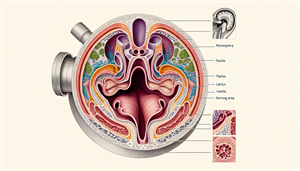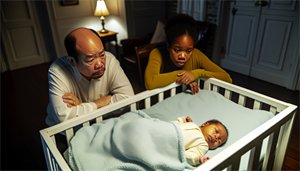When your baby snores, it can spark concern. Baby snoring in infants can be normal, but there are times when it indicates a health issue.
This article explains why babies snore, identifies potential causes, and highlights when medical advice is necessary.
Key Takeaways
-
Snoring in babies is common due to small airways and can be normal, but persistent, loud snoring may indicate underlying conditions like enlarged tonsils, adenoids, allergies, or sleep disorders such as sleep apnea.
-
Symptoms of sleep apnea in infants include difficulty breathing, frequent waking, recurring respiratory infections, and it should be promptly evaluated by a pediatrician due to potential long-term health effects.
-
While some snoring can be alleviated with home remedies, persistent or severe cases may require medical intervention including medication, surgery, or sleep studies for proper diagnosis and treatment.
Decoding the Whispers in the Crib: Unraveling Newborn Snoring

Newborn snoring, characterized by a raspy sound during sleep, is a common occurrence, with approximately 3% to 9% of infants snoring regularly by the age of 3 months. This noisy breathing happens when the soft tissues in the throat become relaxed and obstruct the airway.
While typical baby snoring does not warrant immediate concern, it could indicate certain underlying conditions that may necessitate medical evaluation in certain instances, especially if it affects the quality sleep of the baby. Such potential underlying conditions could include laryngomalacia and other sleep disorders that are associated with snoring in infants.
The Symphony of Sleep: Normal Baby Noises
Snoring in babies is usually caused by their small and narrow breathing airways, which can fill with mucus and fluids. The petite nasal passages can lead to not only snoring but also whistling or snuffling sounds during sleep, and sometimes breathing slows down.
Occasional snoring in babies should not be immediately considered a cause for concern, particularly in newborns younger than 1 month old who may experience periods of fast breathing after momentarily stopping and do not exhibit changes in color or loud breathing during sleep. However, if you notice poor weight gain or other developmental issues, it’s important to consult a pediatrician.
When Snoring Suggests Something More: Identifying Abnormal Sounds
Persistent and loud snoring, which is not usual for infants, could signal a serious breathing problem during sleep. For instance, obstructive sleep apnea (OSA) in infants is a condition characterized by the closure of the throat during breathing, leading to the production of a rough snoring sound.
Central sleep apnea, a type of sleep disorder, is an even more serious condition, as it is characterized by recurring periods of reduced or stopped breathing. This is often accompanied by a bluish tinge to the skin.
Another condition to be alert about is laryngomalacia, a congenital condition that results in the collapse of the airway during inhalation, causing stridor or ‘noisy breathing’.
Pinpointing the Culprits Behind Your Child's Snoring

Frequent causes of snoring in children encompass enlarged tonsils, adenoids, allergies, and sleep apnea. If your child’s snoring appears to be excessive, these potential causes should be examined.
Enlarged tonsils and adenoids can obstruct your baby’s airway, reducing airflow during sleep and thereby causing snoring. Allergies can also play a part, causing inflammation in the nose and throat, leading to swelling of the nasal passages and resulting in snoring due to restricted airflow.
Tonsils and Adenoids: The Usual Suspects
Tonsils and adenoids are specialized lymph glands situated at the posterior region of the nose and throat. When they become enlarged, they can obstruct the airway of a baby, reducing airflow during sleep and thereby causing snoring.
Indeed, one might attribute the snoring in infants and toddlers to enlarged tonsils and adenoids that obstruct the airway causing vibrations in the throat’s soft tissues, thus producing the snoring sound.
Allergies and the Airway: A Sniffling Concern
An allergic reaction can result in inflammation and constriction of the air passages, leading to snoring in babies. This occurs due to the inflammation causing nasal congestion and obstruction of the airway, making it challenging for the baby to breathe during sleep.
The prevalent types of allergies that can contribute to snoring in babies include those causing inflammation in the nose and throat, such as chronic allergies leading to nasal blockage, and non-allergic rhinitis.
Sleep Apnea in Infants: Recognizing the Red Flags

Sleep apnea, a serious medical condition closely related to snoring in infants, presents symptoms including:
-
Snoring
-
Difficult breathing
-
Frequent waking
-
Recurring respiratory infections
These symptoms, along with any other symptoms, require immediate medical attention.
The estimated prevalence of sleep apnea in infants ranges between 1% to 4%. Early identification of sleep apnea signs is vital for timely intervention and treatment, which can thwart potential complications.
The Telltale Signs: From Loud Snoring to Gasping for Air
Loud snoring and difficulty breathing, including labored breathing, are significant indicators that an infant might have sleep apnea. Infants with sleep apnea may demonstrate distinct patterns in their snoring, such as loud snoring, audible intermittent gasps, and unusual breathing patterns like Cheyne-Stokes breathing.
However, bear in mind that not all infants who snore have sleep apnea. Although snoring is a common symptom of obstructive sleep apnea, additional symptoms such as:
-
gasping
-
choking noises
-
severe restlessness
-
pauses in breathing
-
noisy breathing
-
snorting
should also be considered.
The Ripple Effect: Consequences of Untreated Sleep Apnea
Untreated sleep apnea in infants may have several negative effects, including:
-
Compromising the immune system
-
Contributing to elevated blood pressure
-
Imposing strain on the heart
-
Leading to failure to grow and failure to thrive
-
Having lasting effects on a baby’s overall growth and development.
Furthermore, untreated sleep apnea in children can result in:
-
attention issues
-
hyperactivity
-
disruptive behaviors
-
harm to brain cells associated with cognition and mood, which can result in learning and memory deficits
-
reduced gray matter volume in critical brain areas.
Navigating Through Nighttime Noises: When to Seek Medical Advice

Consistent snoring for four or more consecutive nights, or snoring on three or more nights a week accompanied by other signs of sleep disruption in your baby could suggest sleep issues that necessitate further attention.
Immediate medical attention should be sought if your infant exhibits signs of:
-
trouble feeding or swallowing
-
acid reflux
-
visible sucking-in of the skin in the middle of the neck
-
choking or gasping noises during sleep
-
extreme restlessness
-
pausing for breaths, gasping for air, choking, having noisy breathing, or snorting.
The Checklist: Following Symptoms That Demand Attention
If your baby’s snoring continues and becomes more severe despite trying remedies such as saline drops, it is advisable to seek medical advice. Particular symptoms of severe infant snoring that necessitate immediate medical attention include:
-
Gasping or choking noises
-
Extreme restlessness
-
Pauses for breaths
-
Noisy breathing or snorting sounds
-
Difficulty breathing during sleep
Therefore, it is vital to closely monitor your baby’s sleep patterns and keep track of any unusual or distressing symptoms, such as restless sleep. If these signs appear, you should contact your pediatrician promptly.
Consulting the Experts: The Role of Pediatricians in Sleep Disorders
Pediatricians play a critical role in diagnosing sleep disorders in infants through the evaluation of sleep patterns and discussions with caregivers about sleep-related concerns. They assess snoring in infants through a comprehensive physical examination, taking into account the child’s symptoms, medical history, and input from caregivers regarding the frequency and severity of the snoring.
Moreover, pediatricians typically utilize a range of diagnostic tools including sleep laboratory studies, routine screening, sleep logs, questionnaires, video recordings, and actigraphy recording to identify sleep disorders in infants. In severe cases, they can refer patients to otolaryngologists, pediatric pulmonologists, pediatric neurologists, and sleep specialists who are experienced in infant sleep disorders for more detailed assessment and treatment.
Remedies and Relief: Addressing Your Baby's Snoring

There are several ways to alleviate your baby’s snoring at home, such as:
-
Utilizing a baby humidifier in their room to alleviate any nasal congestion at night
-
Employing an air purifier to enhance air quality
-
Placing them on their back to sleep on a firm, flat surface (recommended sleeping position for babies who snore)
However, if your baby’s snoring persists and worsens, consider seeking medical intervention. Medical advice is crucial if the snoring is accompanied by sleepwalking, sleep talking, or other concerning symptoms.
Home Care Strategies: Easing Your Baby's Breathing at Night
Improving air quality is essential in reducing baby snoring. This may include the use of an air purifier to purify the air and a humidifier to maintain optimal moisture levels, thereby aiding in keeping the baby’s nasal passages clear. Humidifiers play a significant role in easing a baby’s snoring by moistening the air and alleviating nasal congestion, thus allowing for smoother breathing during sleep.
Moreover, the body position also plays a significant role in a baby’s snoring and breathing. Sleeping on the side or stomach can help keep airways open, thus reducing snoring and potential breathing difficulties.
When Surgery Is the Answer: Understanding Medical Interventions
In severe cases, medical interventions may be necessary. The recommended medical interventions for infants with severe snoring, or Sleep-Disordered Breathing (SBD), include medication to shrink tonsils and adenoids or surgery to remove them. The surgical procedure for removing tonsils and adenoids in infants typically lasts between 45 and 60 minutes, while an adenoidectomy alone takes approximately 30 to 40 minutes.
Following tonsil or adenoid surgery in infants, the average recovery period is approximately 2-3 weeks. It’s important to note that any form of surgical intervention should only be considered after discussing with your child’s doctor and thoroughly understanding the risks and benefits involved.
The Importance of Sleep Studies in Diagnosing Baby Snore
Sleep studies are pivotal in diagnosing snoring in infants by providing valuable understanding of their sleep patterns, breathing, and overall health. These studies assist in identifying underlying sleep disorders or breathing issues, such as sleep apnea, thereby improving the infant’s sleep quality and overall health.
Sleep apnea in infants is usually diagnosed through an overnight polysomnogram, which observes the infant’s breathing patterns and rates while they are asleep. Early identification of sleep apnea signs is vital for timely intervention and treatment, which can thwart potential complications.
Inside the Sleep Lab: What Happens During a Sleep Study?
A sleep study in infants involves:
-
Monitoring the baby while they sleep
-
Sensors attached to measure brain activity, heart rate, breathing patterns, and oxygen levels
-
The study usually takes place in a sleep lab or hospital
-
Conducted by trained technicians
-
Data is collected over the course of the night, typically lasting several hours.
To prepare an infant for a sleep study, follow these steps:
-
Explain the procedure using simple language.
-
Ensure the baby’s hair is clean and dry.
-
Create a comfortable environment.
-
Reduce naps on the study day, as this might prove beneficial.
Interpreting Results: How Sleep Studies Guide Treatment
The findings from a sleep study are crucial in providing insights into the characteristics and intensity of a child’s snoring and breathing disturbances while sleeping. This data is pivotal for healthcare experts in diagnosing issues such as pediatric sleep apnea and identifying the most appropriate treatment method, whether it involves non-surgical options or surgical procedures like adenotonsillectomy.
Surgery may be recommended as a treatment option if sleep studies uncover correctable causes of snoring in infants, such as swollen tonsils or adenoids. Polysomnography plays a crucial role in identifying these underlying conditions and aiding healthcare providers in making such determinations.
Summary
As we’ve seen, snoring in infants is a multifaceted issue that can be influenced by a range of factors, such as allergies, enlarged tonsils, and even sleep apnea. While occasional snoring is normal, persistent and loud snoring could be a sign of underlying health issues. It’s important to be alert to any changes in your baby’s sleep patterns and seek medical advice if you have any concerns. After all, a good night’s sleep is not just crucial for your baby’s growth and development, but also for their overall well-being.
Frequently Asked Questions
Should I be worried if my baby snores?
Yes, you should be concerned if your baby snores as it may be a sign of a medical condition that requires attention from a pediatrician or pediatric ENT specialist.
Is my baby congested or snoring?
If your baby appears happy, feeds and sleeps normally, and does not have a fever, the congested nose and snoring are likely not a cause for concern. Keep an eye on any changes or signs of distress in your baby's breathing.
When should snoring be a concern?
Snoring should be a concern if it is accompanied by symptoms such as long pauses in breathing, choking, or gasping for air, as these could indicate obstructive sleep apnea. If you experience these symptoms, it's important to consult a doctor for further evaluation.
Is it normal for babies to snort while sleeping?
It is normal for babies to snort while sleeping, especially during the first 12 months of life when they can't breathe comfortably through their mouths. These sounds are often not a cause for concern, as they may be due to extra fluid or mild nasal swelling.
What is the prevalence of snoring in infants?
Approximately 3% to 9% of infants snore regularly by the age of 3 months, indicating that snoring is not uncommon in this age group.


